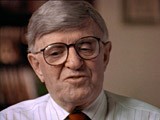You searched for: death marches
<< Previous | Displaying results 41-50 of 105 for "death marches" | Next >>
-
Thomas Buergenthal describes the liberation of the Sachsenhausen camp
Oral HistoryThomas's family moved to Zilina in 1938. As the Slovak Hlinka Guard increased its harassment of Jews, the family decided to leave. Thomas and his family ultimately entered Poland, but the German invasion in September 1939 prevented them from leaving for Great Britain. The family ended up in Kielce, where a ghetto was established in April 1941. When the Kielce ghetto was liquidated in August 1942, Thomas and his family avoided the deportations to Treblinka that occurred in the same month. They were sent…
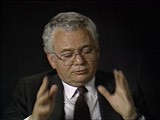
-
Siegfried Halbreich describes conditions and forced labor in the Gross-Rosen camp
Oral HistoryAfter Germany invaded Poland on September 1, 1939, Siegfried fled with a friend. They attempted to get papers allowing them to go to France, but were turned over to the Germans. Siegfried was jailed, taken to Berlin, and then transported to the Sachsenhausen camp near Berlin in October 1939. He was among the first Polish Jews imprisoned in Sachsenhausen. Inmates were mistreated and made to carry out forced labor. After two years, Siegfried was deported to the Gross-Rosen concentration camp, where he was…
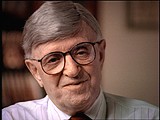
-
Ruth Meyerowitz describes sabotage effort in Malchow munitions factory
Oral HistoryIn Frankfurt, Ruth's family faced intensifying anti-Jewish measures; her father's business was taken over and Ruth's Jewish school was closed. In April 1943, Ruth and her family were deported to Auschwitz. Ruth was selected for forced labor and assigned to work on road repairs. She also worked in the "Kanada" unit, sorting possessions brought into the camp. In November 1944, Ruth was transferred to the Ravensbrueck camp system, in Germany. She was liberated in May 1945, during a death march from the…

-
David (Dudi) Bergman recalls the importance of work for survival in the Plaszow labor camp
Oral HistoryThe Germans occupied David's town, previously annexed by Hungary, in 1944. David was deported to Auschwitz and, with his father, transported to Plaszow. David was sent to the Gross-Rosen camp and to Reichenbach. He was then among three of 150 in a cattle car who survived transportation to Dachau. He was liberated after a death march from Innsbruck toward the front line of combat between US and German troops.

-
Fritzie Weiss Fritzshall describes deportation in cattle car to Auschwitz
Oral HistoryFritzie's father immigrated to the United States, but by the time he could bring his family over, war had begun and Fritzie's mother feared attacks on transatlantic shipping. Fritzie, her mother, and two brothers were eventually sent to Auschwitz. Her mother and brothers died. Fritzie survived by pretending to be older than her age and thus a stronger worker. On a death march from Auschwitz, Fritzie ran into a forest, where she was later liberated.

-
Siegfried Halbreich describes arrival at and brutality in the Gross-Rosen camp
Oral HistoryAfter Germany invaded Poland on September 1, 1939, Siegfried fled with a friend. They attempted to get papers allowing them to go to France, but were turned over to the Germans. Siegfried was jailed, taken to Berlin, and then transported to the Sachsenhausen camp near Berlin in October 1939. He was among the first Polish Jews imprisoned in Sachsenhausen. Inmates were mistreated and made to carry out forced labor. After two years, Siegfried was deported to the Gross-Rosen concentration camp, where he was…
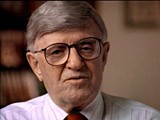
-
Steven Springfield describes the treatment of Jews in the Riga ghetto
Oral HistoryThe Germans occupied Riga in 1941, and confined the Jews to a ghetto. In late 1941, at least 25,000 Jews from the ghetto were massacred at the Rumbula forest, near Riga. Steven and his brother were sent to a small ghetto for able-bodied men. In 1943 Steven was deported to the Kaiserwald camp and sent to a nearby work camp. In 1944 he was transferred to Stutthof and forced to work in a shipbuilding firm. In 1945, Steven and his brother survived a death march and were liberated by Soviet forces.

-
Steven Springfield describes a massacre in the Rumbula forest near Riga, Latvia
Oral HistoryThe Germans occupied Riga in 1941, and confined the Jews to a ghetto. In late 1941, at least 25,000 Jews from the ghetto were massacred at the Rumbula forest, near Riga. Steven and his brother were sent to a small ghetto for able-bodied men. In 1943 Steven was deported to the Kaiserwald camp and sent to a nearby work camp. In 1944 he was transferred to Stutthof and forced to work in a shipbuilding firm. In 1945, Steven and his brother survived a death march and were liberated by Soviet forces.
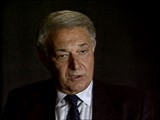
-
Lily Mazur Margules describes the dehumanization she felt in the Kaiserwald camp
Oral HistoryLily was forced into a ghetto after the Germans occupied Vilna in 1941. She was forced to work until the liquidation of the ghetto in 1943 when she was deported to the Kaiserwald camp near Riga, Latvia. From there she was sent to work in the Duenawerke labor camp. She was deported by ship across the Baltic Sea to the Stutthof camp and was taken to a nearby labor camp. Lily was liberated during a death march which ended in the town of Krumau, East Prussia, in 1945.
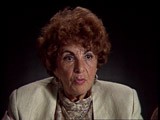
-
Siegfried Halbreich describes conditions in the Sachsenhausen camp
Oral HistoryAfter Germany invaded Poland on September 1, 1939, Siegfried fled with a friend. They attempted to get papers allowing them to go to France, but were turned over to the Germans. Siegfried was jailed, taken to Berlin, and then transported to the Sachsenhausen camp near Berlin in October 1939. He was among the first Polish Jews imprisoned in Sachsenhausen. Inmates were mistreated and made to carry out forced labor. After two years, Siegfried was deported to the Gross-Rosen concentration camp, where he was…
